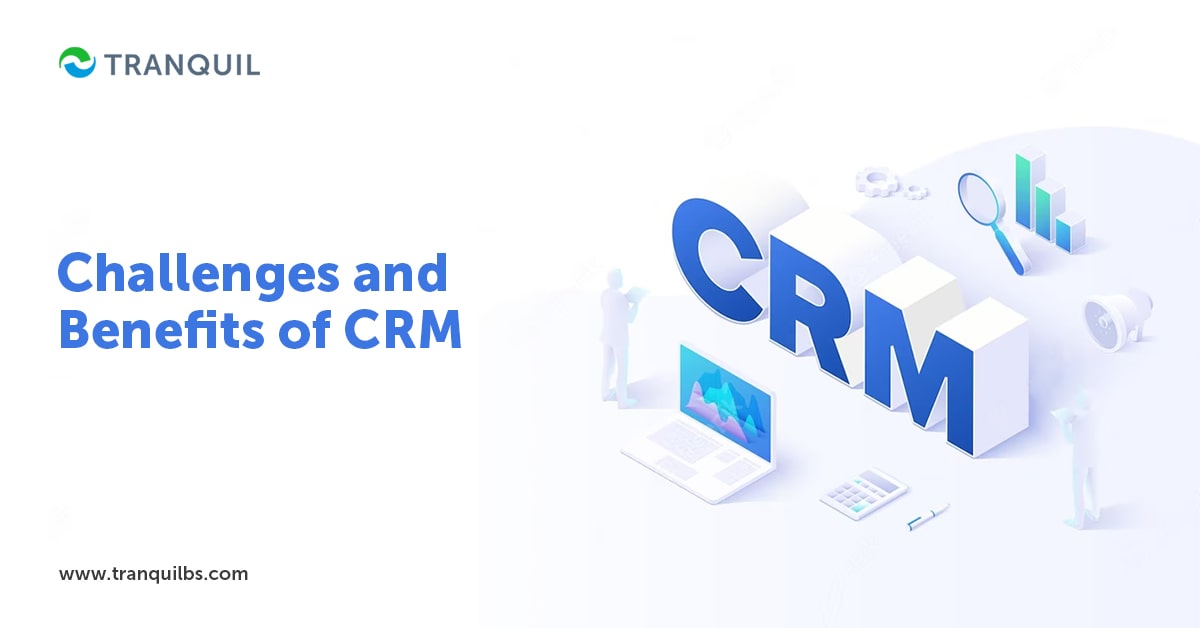
Customer Relationship Management is a software that helps businesses manage interactions between potential and existing customers.
It contains detailed information about customers in a database that helps businesses engage better, and support marketing and sales activities, among other things.
The main goal of a CRM solution is to help nurture and close leads, boost sales and spur growth.
A CRM system tracks all customer interactions, simplifying the understanding of the customer lifecycle.
This allows crafting and delivering personalized marketing campaigns to customer personas.
It also allows sales executives, marketing teams, and customer support personnel to be on the same page.
CRM is an indispensable tool that helps organize customer data, but manual data entry can be cumbersome.
However, the solutions available today are more sophisticated and use AI, provide recommendations, etc., which enhance marketing and optimize workflows.
ALSO READ : Challenges in ERP Implementation

Let’s take a detailed look at the benefits and challenges of CRM.
First let’s discuss how CRM solutions benefit businesses.
When you provide relevant and personal marketing messages and customer service to customers, you provide an engaging and effective experience, boosting satisfaction and sales.
It is essential that customer data is recorded meticulously; this includes all interactions, their demographics, and buying history.
With these records, customers can avoid repeating their information to service executives; and marketers can conduct targeted marketing.
ALSO READ : Benefits of ERP for Accounting and Financial Management
With comprehensive customer data available in the CRM database, you have an interactive digital record, including their language preferences, social media profiles, birthdays, anniversaries, etc.
It becomes much easier to establish a personal connection with a customer and helps you have the edge in every deal.
Some of the details you can see at a glance are: history of contact, orders, support requests, documents, delivery status, web behavior, notes, and so on.
The majority of purchases depend on how important a customer feels.
CRM gives in-depth customer information whenever you want, allowing you to show them how well you know them, displaying your investment in cultivating their business – and this motivates customers to keep returning to you.
ALSO READ: How Does Landed Cost Affect the Cost of Inventory?
CRM systems help in retaining customers and building loyalty; if you can increase retention by just 5%, you can increase up to 25% in profits.
The software lets you automate tasks and set reminders that allow you to fulfil promises made.
By segmenting contacts, you can identify those you haven’t interacted with recently, and contact them.
Retaining customers is much more economical than acquiring new ones.
After-sales communication can also be automated, allowing you to stay in touch after transactions complete.
ALSO READ : Influence and Importance of ERP System in Different Industries
By integrating tools like e-sign apps and calendar with CRM, companies can streamline their workflows.
The software can populate forms with customer’s information taken from CRM database to speed up and simply e-signatures.
As employees can perform multiple tasks from a single interface, their productivity is enhanced.
Integration with email and calendar allows them to see their scheduled appointments, customer interactions, and sales pipelines in a single place.
The eventual aim of CRM software is boosting sales and revenue.
This is achieved by:
ALSO READ : Benefits Of Software As A Service
With improved efficiency businesses can cut costs, leading to improved sales.
With automation of routine manual tasks, employees are free to focus on core, value-adding activities.
Moreover, by measuring KPIs, you can recognize deficiencies in your sales process, ineffective campaigns, and unproductive employees.
This means you can resolve issues early on rather than wait till they blow up or you detect them in your quarterly reports.
CRM software also facilitates inter-departmental collaboration, increasing efficiency and decreasing redundant data and discrepancies, which translate into lower expenses.
ALSO READ: Sales Order vs Purchase Order

Every country and region have stringent regulations to protect consumer privacy and puts them in control of how their personal and sensitive information is collected, stored, and used.
Businesses that don’t comply with these regulations face hefty fines and other penalties – and leave consumers worried about the safety of their personal information.
CRM software manages data superbly; it helps you to gather and record privacy permissions of customers and leads, manage subscriptions, and send alerts when changes to privacy policies are made.
It maintains a comprehensive record of all the interactions of the contact with your business.
This way, you can be in compliance with regulations and increase customer confidence.
Your CRM software functions as a record of customer contact details, behaviors, interactions, preferences, and notes.
Being a cloud-based software, CRM is always up-to-date; employees can access these records whenever they need, delivering optimal solutions and outstanding service.
The in-built collaboration tools enable multiple individuals to work on the same file at the same time, and they can even track quotes or other document’s progress.
As the communication channels integrate into a unified platform, it helps keep customer interaction consistent regardless of departments.
It gets rid of siloed information between departments, software, and employees, thanks to the cross-channel communication being reliable and systematic.
ALSO READ: Importance of Goods Received Note
Today, many CRM solutions leverage AI to deliver recommendations and valuable business insights.
This includes forecasting tools that identify customer data trends to recommend the actions to be performed next, to boost sales.

Regardless of the many benefits they offer, the challenges of CRM are also many.
It is essential that organizations consider these before they take the plunge to purchase CRM software.
ALSO READ: Why Safety Stock is Important?
We just read that customer data is centralized!
Then how does this happen? This is because, often, different departments use their own preferred CRM solutions.
This leads to siloed information, and problems can arise when sales agents and service agents transfer customers between themselves.
When sales and service departments access different information, customers have to repeat all information, causing annoyance.
Of course, this can be resolved by ensuring that only a single CRM is used across the organization, or by implementing a customer data platform that centralizes information from CRM to give access to all departments.
ALSO READ: Credit Note Vs Debit Note
While CRM software records important customer data, it can be cumbersome to manually enter all the information and maintaining it.
It becomes especially problematic when sales reps have to travel frequently, leaving them with little time to keep on updating the information.
Modern CRM solutions are available, however, that populate customer accounts with data extracted from emails, SMSs, and phone calls, simplifying this process.
This is one of the biggest challenges for any organization when it comes to implementing new systems.
It is imperative that top management and business leaders are completely supportive of the implementation and the possible changes that may arise due to the new system, for the implementation to be truly successful.
When the leaders are not supportive, employees could struggle to adopt the new system; the whole purpose of the project is lost in such cases.
ALSO READ: Guide on Cost Reduction Strategies in Procurement
Unfortunately, some managers view CRM solutions as mere tools of reporting, and use it simply to monitor employee activity and measuring their KPIs.
This can backfire, causing employees to mistrust and dislike the software, and even refuse to be part of the system.
With poor engagement, you will not have the proper data, and metrics won’t mean anything.
Employees may even resort to entering functional or partial information, completely destabilizes the purpose of the CRM software as a central source of truth.
It is very important for the management to patiently explain to the team how the CRM works and how it actually benefits them as well as the company.
This is another huge roadblock; some departments may go head-over-heels for the new software, but others may resist and consider it unnecessary.
After all, CRM solutions may not deliver excellent functionality for all the departments, and you could end up with unhappy employees who never wanted this tool.
It would be useful to focus on the benefits delivered to the customer, so that they can get over the grief that their department has not got the better deal as compared to another.
Eventually, everyone wants value addition to their customer base.
ALSO READ: Common Inventory Management Problems and Solutions
The world we live in is one of instant gratification; everything from food to payments to satisfaction must be instant!
The same goes for software as well.
Immediate results are needed! However, it does not work that way – CRM software takes time for its full potential to be realized.
It takes a few years to get returns on your investment – but in the long run, it’s worth it.
CRM systems have undergone transformation and evolution and their functionality has multiplied.
Today, we have different types of CRM like:
ALSO READ: Benefits of Integrating E-Commerce and ERP

Before selecting any CRM system, it is important that management defines goals for the CRM, and examines the options available to them.
They can follow these steps to ensure they have the right platform for their requirements.
ALSO READ: Common Problems in Manufacturing Industry
Are you confused about the different options in the market? Don’t be! With Tranquil’s powerful customer management feature, you get everything that a CRM does, with much lesser mess and fuss. What’s more, being part of the ERP, you don’t need to worry about integrations, as ERP is a on-stop business solution for all your functions. Do schedule a FREE demo of our software, and we will answer your queries.